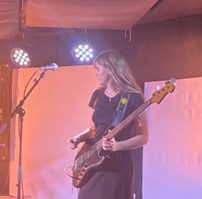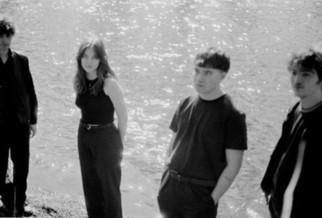
Alongside performing, 2022 music graduate Lauren works as a community music project apprentice. Keep reading to see how she got there, her plans for the future, and her advice for early careers in the arts.
How I got here
I’m Lauren, 2022 graduate and community music project apprentice. I often found music education a bit isolating, having focused on playing the guitar, as many classical opportunities (such as joining orchestras) were off-limits to me. My career options weren’t made clear, so I did a lot of my exploring independently.
“With careers in the arts, there are so many hidden opportunities that are only advertised internally, so I can’t emphasize enough the importance of starting voluntarily somewhere”
In high school, I participated in a multi-disciplinary arts project with Community Music Wales (CMW), completing a song writing and performance project. I met other local musicians who I’m still in contact with now, and I absolutely loved it. I kept in touch with CMW, and after university, I completed their fully funded, two-week tutor training course, qualifying me to give freelance music sessions on their projects. On my last day of this course, I was encouraged to apply for their paid, part-time music project apprenticeship scheme, which I did, successfully!
With careers in the arts, there are so many hidden opportunities that are only advertised internally, so I can’t emphasize enough the importance of starting voluntarily somewhere, to get your foot in the door. Getting involved with CMW led to the training course and onto my current role. I realise that completing voluntary, or part-time work is easier said than done, especially if you have already graduated. Personally, I moved back home after university, so that I could afford to start in my part-time role.
My current role
In my apprenticeship, I plan and deliver my own music project to young people, which I really enjoy. It’s a great balance between people-facing activities (assisting workshops) and developing my administrative and project planning skills. I feel so lucky that I get to help widen creative access in the community I grew up in. Working here also supports my band, Slate, as I learn how to market music and apply for funding grants. As it’s a day job, I’m free in the nights to play gigs, too.
Future career plans
I hope to progress to a full-time project officer. I’ve looked at person specifications for roles I’m interested in and noted the skills which I’m missing. Employers often ask for extensive administrative experience -data processing, cash handling and booking meetings. I’m currently applying to part-time administrative roles in the arts, alongside my apprenticeship, to improve my skills. Because I work in Wales, many jobs list Welsh language as a desirable feature. I’m starting a government-funded Welsh language course and learning through Duolingo, to further strengthen my applications.
“I’ve looked at person specifications for roles I’m interested in and noted the skills which I’m missing.”
In my final year at university, I volunteered at Leading Lights, a Bristol-based mental health charity, chatting to young people, and providing over-the-phone emotional support. I already knew that I loved working with people, but this made me realize how much I enjoyed making a difference to people’s lives. Through CMW, I learned about music therapy careers, which perfectly combine my interests in music and mental health. Ultimately, I want to specialize in this, potentially doing a master’s degree later in life. For now, though, I’m enjoying working in a community-centered role rather than in a healthcare setting.
My advice for careers in the arts
Don’t be disheartened by unsuccessful applications!
The creative sectors can be insanely competitive. Before this role, I was interviewed for a BBC operations apprenticeship but didn’t hear back from them. At the time I was gutted, but I ended up in a sector that appeals to me so much more.
Check the Arts Council of England/ Wales websites for opportunities.
They run great training courses, like my CMW tutor training course, which strengthen your CV, and build your network. I always found networking events intimidating, but on these courses, you can speak to people in different industries, without so much pressure.
Be prepared to volunteer and make connections.
Recruitment in the arts relies a lot on who you know, and I didn’t have connections in the creative industries before I made them myself. I’ve found that when you’re straight out of university, people are more than happy to talk with you and are often very willing to put you in contact with others.
Take Lauren’s advice further by reading this article on networking in the creative industries, or our performing arts sector guide to find out entry requirements, and where to find graduate jobs. Ready to apply? Browse opportunities here.

